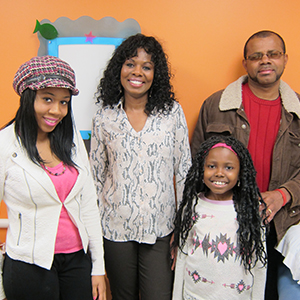Sickle Cell: Romel and Nicole’s story


About this episode
Romel and Nicole discuss their experience with the Caribbean medical care system compared to the United States. They agree that the team at Children’s Minnesota has delivered outstanding care for their daughter, Daniella.
Topics:
- Diagnosis
- Support
- Resilience
- Fears and challenges
Transcript
Romel: When Daniella was first diagnosed with Sickle Cell, how did you feel towards her diagnosis?
Nicole: I was quite irate. I thought it was a mistake. Didn’t make any sense. The world didn’t seem clear. Was very cloudy and I still ask myself everyday if that’s real, but realization hit me and I realize it is real, but you know what? Time went on. Thanks to Dr. Nelson and the great healthcare they have in the United States, it makes a great transition. She’s well-cared for and her medication makes her feel well and keeps her being a normal kid. I do have to say, though, the healthcare system in the Caribbean where her dad was diagnosed as not having [the] sickle cell trait, that’s the problem. I really think the healthcare system in the Caribbean needs to be restructured and be implemented in a correct way so they won’t have a lot of misdiagnosis again, to help prevent these sort of issues from happening. It was such a miracle, what creation can bring. I was joyful, however I was sad when I found out her diagnosis but I still loved her as any other parent would love their child. She definitely believes there’s a God above and the Lord will take care of her. She does not carry a burden on her. Although she knows she has a disease called sickle cell, she doesn’t let that stop her and she embraces it and she tells a story about her disease, and she let other kids understand what it is about and there’s nothing to fear. She even told her kids about her Make-A-Wish trip that she got from the Make-A-Wish Foundation and [how] she went to Florida and Disney World and had a great time.
I wish one day I can go back to the Caribbean but currently, I need to stay here due to the healthcare situation and the inability for the Caribbean countries to provide the healthcare needed for Daniella ’s care, so I have to stay here in the meantime until at least a cure happens. I have to say sickle cell could be treated just like any other disease, diabetes or asthma. If you have it, you have to take medication, so you can live with it and live a healthy life. but I have to thank God, in Daniella’s situation, the medication she’s taking, as well as having her care from Children’s Hospital and Dr. Nelson, she’s doing very well, thanks to all that and everyone and God; I have to put first, too.
I’m always thinking what if and the thought of knowing that she can have a lot of issues that most people do with sickle cell, it stresses me out but I trust in the Lord that those things never happen and praying that soon they will have a cure, so she would never have to experience those things. You know in the back of your head she has a disease; it’s always gonna be in the back of your head. It’s a stressful thing. But with faith, you go by and you try to stay happy and not think about it. I would let them know, first of all, to have faith, trust in God and trust in Dr. Nelson, stay compliant with the medication, stay compliant with the care that is available for the child and don’t look at the child as a handicap. Look at the child and treat the child as any other normal child and they can live a normal, healthy life. Having sickle cell disease does not make you a handicap. It just doesn’t. It doesn’t stop you from doing normal things like other kids or other people can do.
Romel: It makes me afraid to know what could happen to her and we know that we just have to take her to the hospital to make sure she don’t have any sort of infection and make sure that the fever is under control.
Nicole: Does it make you feel upset when you think about the first day that you went to the laboratory to get tested to see if you had the trait? Does it make you feel frustrated to know that they told you had negative for sickle cell trait and when you called me and told me that you were negative and it’s okay to have a healthy child, how does it make you feel to know that this situation could have been avoided?
Romel: At first it made me sad and upset to know that my first born [was] born with a disease which I never think could happen. They informed me as soon as I got back in the Caribbean. It was something that no one should experience. And I asked them for a certain test and they did something else and it was embarrassing and also disheartening to know that something else could have been done differently. I probably [would have] wanted the pregnancy to continue because it’s a gift from God, so no matter what the circumstances of a condition, I would have still wanted her because she’s my daughter so… she’s my daughter.
Nicole: How does it make you feel when you know she has to take medication every day and you know there’s a possibility there could have been side effects with her medication? How does that make you feel?
Romel: Well, I just seen Dr. Nelson and he is amazing and all medicine have side effects but it works. It keeps her healthy and that’s all I want in order for her to be healthy.
Nicole: So you’re saying that as long as it takes to get her the healthcare she needs, you will stay here in the United States. Would you consider moving to a different state if you can get the same kind of healthcare treatment as Dr. Nelson provides to her? Would you consider moving to a different state if you have that sort of treatment available?
Romel: Yes, possibly, yes. Ones that has the adequate treatment for sickle cell, yes, but for Minnesota, it’s a good treatment facility and it’s top of the line so wherever she is safe, I’m happy to be there. Any time we are planning a trip to go to the Caribbean, I always think about if she have a crisis when [we’re] back in Trinidad so I always pray that she stays healthy until we’re ready to come back.
Nicole: I consider Hydroxyurea a miracle drug. Hydroxyurea increases the hemoglobin F level, the fetal hemoglobin, that declines at the age of 6 months old in all babies, and when a person has sickle cell, the A hemoglobin does not exist inside the blood, it’s totally out, and the hemoglobin F level diminishes and you only have S, which is the sickle genes. Having a high amount above 3 percent of fetal hemoglobin lessens your chances of having [a] sickle cell crisis. So it’s really important to have your kids on Hydroxyurea. It increases the fetal hemoglobin, there’s a possibility of preventing pain crisis and other severity and other organ damages, and it really makes your child’s life much better in a daily outcome. Currently, [with] Daniella, Hydroxyurea had brought her hemoglobin F levels, her fetal hemoglobin that is, to above 40 percent. That’s really good. That’s basically having a cure for her. So I would encourage anybody to continue or start your child on hydroxyurea. But I’m just grateful for Dr. Nelson, He should be recognized more than he’s being recognized right now.
We wish to extend our thanks to the families who have shared their story here about the impact of living with hemophilia and sickle cell disease. We would also like to thank the many who worked on this project:
The Children’s Minnesota StoryCorps Legacy Team:
Eddie Gonzalez, Jocelyn Bessette Gorlin, Susan Kearney, Stephen Nelson, Margaret Heisel-Kurth, Stephanie Davis, Angela Blue, Elizabeth McDonough, Jill Swenson and Alisa Linne.
Special thanks to:
Stephanie Moua, Hamdi Hussein, Sadia Farah, Fatima Ali, Caillyn Costello, Suzanne Lehman, Suzan Ulrich, D'Ann Urbaniak Lesch, Justin Nelson, Allison Albright, Marvin Holmes-Leopold, Jose Rodriguez and Mitch Hare.
Minneapolis Institute for Production and Recording:
Jose Rodriguez and Mitch Hare.